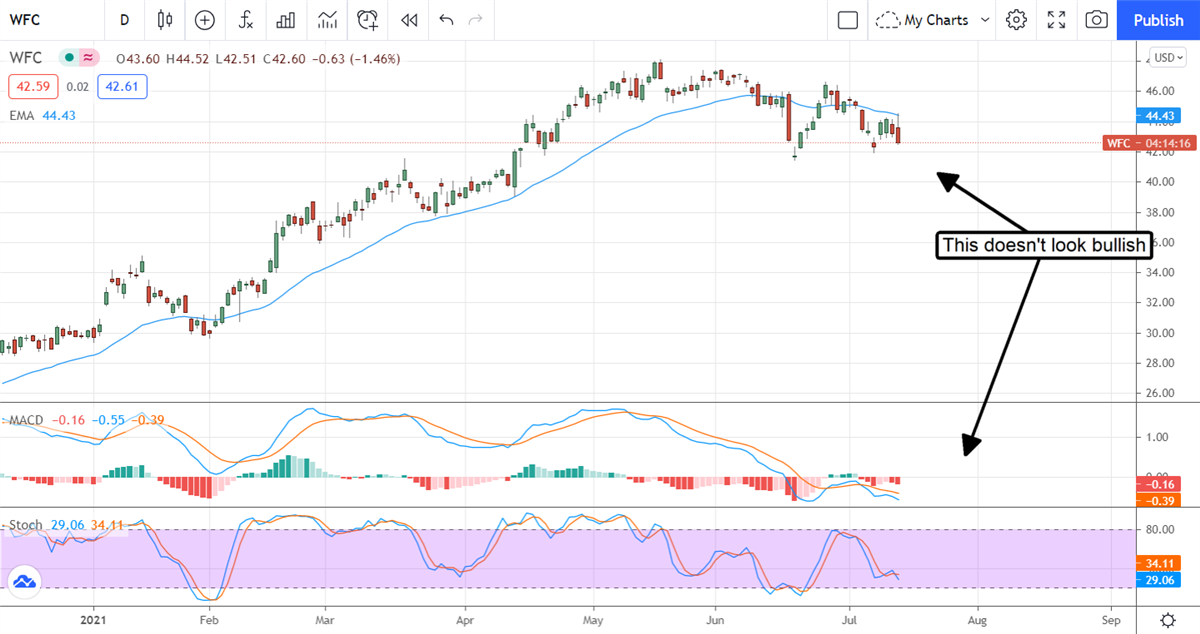Wells Fargo (NYSE: WFC) is faced with a headwind that has emerged for the entire banking sector. The massive amounts of stimulus pumped into the econ…
Free Book Preview Money-Smart Solopreneur
This book gives you the essential guide for easy-to-follow tips and strategies to create more financial success.
4 min read
This story originally appeared on MarketBeat
A Catch-22 For Wells Fargo
Wells Fargo (NYSE: WFC) is faced with a headwind that has emerged for the entire banking sector. The massive amounts of stimulus pumped into the economy are improving general conditions including consumer health and that is cutting into net interest income. The bank makes a large portion of its money on interest charges from credit cards and other loans and that business is flagging. While deposits are on the rise and the company’s ability to make loans is improving, demand for those loans declining.
“Wells Fargo benefited from the continued economic recovery, strong markets that helped drive gains in our affiliated venture capital businesses, and our progress on improving efficiency, but the headwinds of low interest rates and tepid loan demand remained,” said CEO Charlie Scharf.
Wells Fargo Falls On Better-Than-Expected Revenue
Wells Fargo reported better-than-expected revenue but there are many metrics within the report that left the market wanting more. The $20.27 billion in net consolidated revenue is up sequentially and 10.9% from last year beating the consensus by 1400 basis points but still down over the past two years. In the two-year comparison, the company’s revenue is down 6% revealing the lingering impact of COVID-19 on the banking community.
Breaking things down on a segment basis, the bank says total average deposits increased to $1.44 trillion or up $0.05 trillion from last year to beat the consensus of $1.41 trillion while average loans saw a double-digit decline. The average loan balance declined -12% from last year to drive an 11% decrease in net interest income and it doesn’t look like the situation is going to change soon. At best, the company will be able to sustain sequential growth but it will be severely hampered by weakness in NII until consumers start using their credit again.
Moving down to the bottom line, the GAAP EPS of $1.38 beat the consensus by $0.40 but there is an offsetting factor here as well. Although the company was able to improve its efficiency ratio, the $0.40 per share beat was driven in large part by the release of unneeded credit reserves. Wells Fargo released credit reserves of $1.26 billion to help drive a $0.30 per share increase to earnings. Notably, the company’s tier-1 equity ratio came in at 12.1% versus the 12.1% consensus and is down in a range where we view future capital releases as unlikely.
There’s A Big Dividend Increase In The Cards For Wells Fargo
Regardless of the results, it is our view that Wells Fargo has a big dividend increase on the horizon. The company is still struggling with some legacy issues but is emerging from that and the pandemic in better shape than before and is well capitalized to boot. With the current payout ratio only 10% of the consensus earnings estimate, and earnings outpacing the consensus, there is room for a triple-digit and possibly a high triple-digit increase. Tripling the payout to $0.30 quarterly or $4 20 annually would still only be 60% of the pre covid payout level.
The Technical Outlook: Wells Fargo Looks Ready To Move Lower
Price action in Wells Fargo has been a little volatile over the past few weeks but the bias in the wake of the earnings release is definitely bearish. Early price action had shares moving higher but they were repelled by the short-term moving average and now a dark candle has formed. The candle appears to be confirming resistance at the short-term moving average and may lead shares lower in the near term at least. Key support is just below the current price action near $42, if that level holds Wells Fargo will probably move sideways and maybe edge higher later in the summer. If the $42 level breaks down we see Wells Fargo Falling to the $40 to $38 range.

Featured Article: What is a CD ladder?



